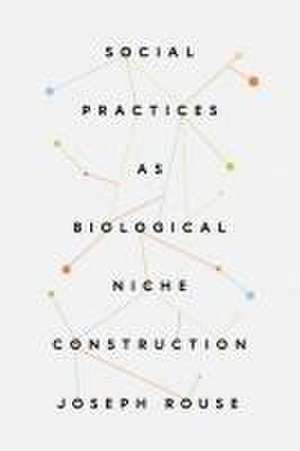Social Practices as Biological Niche Construction
Autor Joseph Rouseen Limba Engleză Hardback – 16 aug 2023
In this book, Joseph Rouse takes his innovative work to the next level by articulating an integrated philosophy of society as part of nature. He shows how and why we ought to unite our biological conception of human beings as animals with our sociocultural and psychological conceptions of human beings as persons and acculturated agents. Rouse’s philosophy engages with biological understandings of human bodies and their environments as well as the diverse practices and institutions through which people live and engage with one another. Familiar conceptual separations of natural, social, and mental “worlds” did not arise by happenstance, he argues, but often for principled reasons that have left those divisions deeply entrenched in contemporary intellectual life. Those reasons are eroding in light of new developments across the disciplines, but that erosion has not been sufficient to produce more adequately integrated conceptual alternatives until now.
Social Practices and Biological Niche Construction shows how the characteristic plasticity, plurality, and critical contestation of human ways of life can best be understood as evolved and evolving relations among human organisms and their distinctive biological environments. It also highlights the constitutive interdependence of those ways of life with many other organisms, from microbial populations to certain plants and animals, and explores the consequences of this in-depth, noting, for instance, how the integration of the natural and social also provides new insights on central issues in social theory, such as the body, language, normativity, and power.
| Toate formatele și edițiile | Preț | Express |
|---|---|---|
| Paperback (1) | 185.66 lei 22-36 zile | +17.45 lei 5-11 zile |
| University of Chicago Press – 12 oct 2023 | 185.66 lei 22-36 zile | +17.45 lei 5-11 zile |
| Hardback (1) | 571.32 lei 43-57 zile | |
| University of Chicago Press – 16 aug 2023 | 571.32 lei 43-57 zile |
Preț: 571.32 lei
Preț vechi: 741.97 lei
-23% Nou
Puncte Express: 857
Preț estimativ în valută:
109.35€ • 113.97$ • 91.03£
109.35€ • 113.97$ • 91.03£
Carte tipărită la comandă
Livrare economică 06-20 ianuarie 25
Preluare comenzi: 021 569.72.76
Specificații
ISBN-13: 9780226827957
ISBN-10: 022682795X
Pagini: 352
Dimensiuni: 152 x 229 x 21 mm
Greutate: 0.66 kg
Ediția:First Edition
Editura: University of Chicago Press
ISBN-10: 022682795X
Pagini: 352
Dimensiuni: 152 x 229 x 21 mm
Greutate: 0.66 kg
Ediția:First Edition
Editura: University of Chicago Press
Notă biografică
Joseph Rouse is professor of philosophy at Wesleyan University, where he is also affiliated with the Science in Society and Environmental Studies programs. He is the author of four previous books, including Articulating the World: Conceptual Understanding and the Scientific Image and How Scientific Practices Matter: Reclaiming Philosophical Naturalism, both also published by the University of Chicago Press.
Cuprins
Introduction: Sociocultural Animals
1 The Social Theory of Practices
2 Ecological-Developmental Niche Construction
3 Postures
4 Practices
5 Normativity
6 Language
7 Discourse
8 Power
9 Finitude
Acknowledgments
References
1 The Social Theory of Practices
2 Ecological-Developmental Niche Construction
3 Postures
4 Practices
5 Normativity
6 Language
7 Discourse
8 Power
9 Finitude
Acknowledgments
References
Recenzii
"Recommended."
“A compelling philosophical account of the human, which transcends the ancient and problematic dichotomies of biology and society, mind and body, and so on, requires both deep and multidisciplinary expertise and philosophical subtlety. Rouse is one of a very few contemporary philosophers with the requisite skill set for this task. Building on the core notions of practice and niche construction, Rouse provides a philosophy of what he calls natureculture that is fully naturalistic without being reductive. This book will provide a benchmark for approaches to this fundamental philosophical topic for some time to come.”
“Rouse is once again on the vanguard of social theory. His naturecultural approach profoundly rethinks practice theory, demonstrating the interdependence of human practices with both the material environment and other organisms. It makes available new ways to think about central topics in philosophy and the social sciences, including normativity, discourse, power, and temporality. I will be reflecting on the consequences of this work for some time.”
